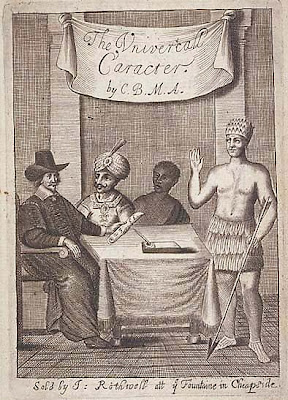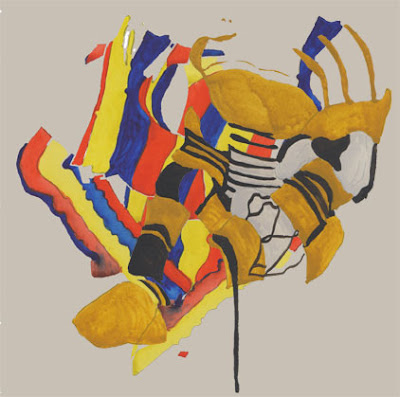Tuesday 31 August 2010
Monday 30 August 2010
Sunday 29 August 2010
a lesson
_ ___ ______ _____ ___ _ ___
) ____) (__ __) / \ | \ | | | \
( (___ | | / \ | |\ \ | | | |
\___ \ | | / () \ | | \ \| | | |
____) ) | | | __ | | | \ | | |
( (_____| |____| (__) |_| |___\ |_| /__
_ ___ ___ __ ____ _________
) ____) (__ __) (_ _) \ | \ |
( (___ | | | | | | | |
\___ \ | | | | | | | | __
____) ) | | _| |_ | |__ | |__ ( )
( (_____| |____( )_/ )_/ )_( /__
____ _____ ___ _ _______ __
/ \ | \ | | | \ (_ _)
/ \ | |\ \ | | | | | |
/ () \ | | \ \| | | | | |
| __ | | | \ | | | _| |_
| (__) |_| |___\ |_| /_____( )_
____ __ __ ____ ____
| | | | (_ _) \ | \ |
| | | | | | | | | |
| | | | | | | | | |
\ \/\/ / _| |_ | |__ | |__
__\ /___( )_/ )_/ )_
___ ______ _____ _______ ____ ___
| \ \ ___) / \ | \ (__ __) ) (
| ) | (__ / \ | | | | / \
| / | __) / () \ | | | | ( )
| |\ \ | (___ | __ | | | | | \ /
| |_\ \_/ )_| (__) |_| /________| |______) (___
_ __ ___ _ __ __
(__ __) \ | | / \ ___) \ ___)
| | | \_/ | | (__ | (__
| | | _ | | __) | __)
| | | / \ | | (___ | (___
___| |____/ |___| \_/ )_/ )_
ascii generator
Thursday 26 August 2010
Wednesday 25 August 2010
Tuesday 24 August 2010
Living London
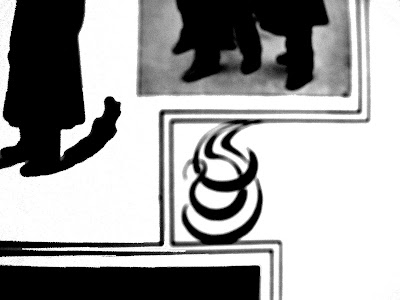


Its work and its play
Its humour and its pathos
Its sights and its scenes
Ed. George R. Sims, Cassell and Co. 1902
Monday 23 August 2010
Sunday 22 August 2010
bare suspicions, naked conjectures, blackest malice
… The Prince of Wales was seized with a distemper, which at first was not thought dangerous. It begun on 10th October, a few days before the Elector Palatine's arrival: but he himself believed it of little consequence, that he accompanied the Elector everywhere for some days. He was not forced to keep his bed till the 25th of the same month, and died the 6th of November, at the age of 18 years (5).
Hw was one of the most accomplished Princes that ever was, I will not say in England but in all Europe, if we may believe what Historians relate of him. He was sober, chaste, temperate, religious, full of honour and probity. He was never heard to swear, though the example of his Father and the whole Court, was but apt to corrupt him in that respect (6). He took great delight in the conversation of men of honour; and those who were not reckoned as such, were looked upon with a very ill eye at his Court. He had naturally a greatness of mind, noble and generous thoughts; and was as much displeased with trifles, as his Father was fond of them. He frequently said, if ever he mounted the Throne, his first care should be to try to reconcile the Puritans to the Church of England. As this could not be done without concessions on each side, and as such a condescension was directly contrary to the temper of the Court and Clergy, he was suspected to countenance Puritanism. He was naturally gentle and affable: but however, in his carriage had a noble stateliness without affectation, which commanded esteem and respect. He shewed a warlike genius, in his passionate fondness for all martial exercises. A French Ambassador coming to take his leave of him, found him tossing the Pike, and asking him, what service he would command him to his Master? The Prince bid him tell him, what he was doing. In short, to say all in a word, though he was eighteen years old when he died, no Historian has taxed him with any vice. The King his Father is said to have been jealous of him, and to ask one day, If his Son would bury him alive (7)? I pass over in silence many things said upon this occasion, particularly what some Authors would insinuate, that the King caused him to be poisoned. In such case, the proofs ought to be as clear as the sun, and I find in the most inveterate Historians against King James, only bare suspicions and naked conjectures, which probably were the fruits of the blackest malice. Others are contented with accusing the Viscount Rochester of this crime, but without any manner of proof. Some slight presumptions, which I shall have occasion to speak of elsewhere, may have helped to breed this suspicion, which indeed was spread immediately after the Prince's death. Wherefore his head and body were ordered to be laid open in the preference of many Physicians and Surgeons, who gave their opinion upon Oath, that no marks of poison appeared (8). But what reflected most upon the King, was his commanding that no person should appear at Court in mourning; …
(6) Being once hunting the Stag, a Butcher's dog chanced to kill the Stag, and spoil the sport, which the Prince not resenting, the Huntsmen and Company, to incense him against the Butcher, told him, "if his Father had been served so, he would have sworn so as no Man could have endured it." Away, (says the Prince) all the Pleasure in the World is not worth an Oath. This R. Coke the Historian had from his Father, who was about the Prince's age.
(8) They gave their Opinions on November 7, under their hands as follows, his Liver wan and paler than ordinary. His Gall without Choler, and distended with Wind. His Spleen unnaturally balck; his Lungs spotted, with much Corruption. The Diaphragma blackish; and the Head full of Blood in some places, and in others of Water. As if (says Wilson) no poison could produce such effects, p.690. See Historic. Narrat. c. 15. Howes says, he died of a malignant Fever, which reigned that year in most parts of the land, and carried away a great number of people of all sorts and ages, p.1004

notable object
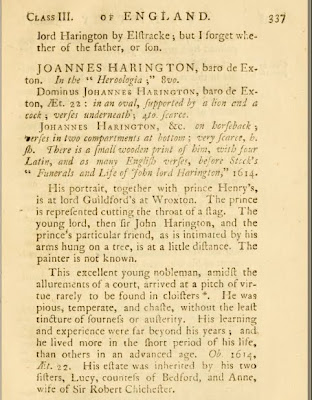

The Wroxton Arch, two 40ft towers with an arch between. It is said to be one of the finest eye catchers, or "notable object", follies in England. It is positioned in a clearing placed at the summit of a hill, It allows the visitor commanding views back across the fields to the Obelisk and, probably before the trees grew up, a view to the Abbey.
cave beck
grangerise
To illustrate a book with pictures taken from published sources, such as by clipping them out for one's own use.
grangerize, grangerise [ˈgreɪndʒəˌraɪz]vb (tr)
James Granger 1723-1776
grangerize, grangerise [ˈgreɪndʒəˌraɪz]vb (tr)
1. to illustrate (a book) by inserting prints, drawings, etc., taken from other works
2. to raid (books) to acquire material for illustrating another book[named after Joseph Granger, 18th-century English writer, whose Biographical History of England (1769) included blank pages for illustrations to be supplied by the reader]
James Granger 1723-1776
- A Biographical History of England, from Egbert the Great to the Revolution: consisting of characters disposed in different classes, and adapted to a methodical catalogue of engraved British Heads: intended as an essay towards reducing our biography to system, and to a help to the knowledge of portraits: interspersed with a variety of anecdotes, and memoirs of a great number of persons, not to be found in any other biographical work. With a preface, shewing the utility of a collection of engraved portraits to supply the defect, and answer the various purposes, of medals, by the Rev. J. Granger, vicar of Shiplake in Oxfordshire. (Fifth edition, six volumes, London, 1824).
Wednesday 18 August 2010
Tuesday 17 August 2010
Monday 16 August 2010
Sunday 15 August 2010
Saturday 14 August 2010
feed the guns
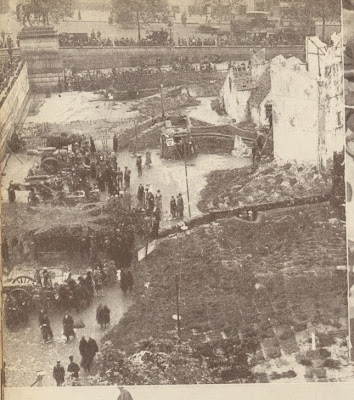
1. Trafalgar Square became a mock battlefield during the 'feed the guns' campaign of september and october 1918
How to Construct a Time Machine
Alfred Jarry
5. Time as seen from the Machine has two Pasts: the past anterior to our own present, what we might call the real past; and the past created by the Machine when it returns to our Present and which in effect is the reversibility of the Future.
Likewise, since the Machine can reach the real Past only after having passed through the Future, it must go through a point symmetrical to our Present, a dead centre between future and past, and which can be designated precisely as the Imaginary Present.
Thus the Explorer in his Machine beholds Time as a curve, or better as a closed curved surface analogous to Aristotle's Ether. For much the same reasons in another text [Exploits and Opinions of Doctor Faustroll, Book VIII] we make use of the term Ethernity. Without the Machine an observer sees less than half of the true extent of Time, such as men used to regard the Earth as flat.
From the operation of the Machine there can easily be deduced a definition of Duration. Since it consists in the reduction of t to o and of o to -t, we shall say:
Duration is the transformation of
a succession into a reversion.
In other words:
a succession into a reversion.
Wednesday 11 August 2010
visor effect
The armour, this 'costume' which no stage production will ever be able to leave out, we see it cover from head to foot, in Hamlet's eyes, the supposed body of the father. We do not know whether it is or is not part of the spectral apparition. This protection is rigorously problematic (problema is also a shield) for it prevents perception from deciding on the identity that it wraps so solidly in its carapace. The armour may be but the body of a real artifact, a kind of technical prosthesis, a body foreign to the spectral body that it dresses, dissimulates, and protects, masking even its identity. The armour lets one see nothing of the spectral body, but at the level of the head and beneath the visor, it permits the so-called father to see and to speak. Some slits are cut into it and adjusted so as to permit him to see without being seen, but to speak in order to be heard. The helmet, like the visor, did not merely offer protection: it topped off the coat of arms and indicated the chief's authority, like the blazon of his nobility.
Derrida/ Specters of Marx p8

Labels:
armour,
blazon,
derrida,
father,
ghost,
heraldry,
patrimony,
shakespeare,
spectre,
tower of london
Monday 9 August 2010
Sunday 8 August 2010
Saturday 7 August 2010
Friday 6 August 2010
progresses, processions and magnificent festivities
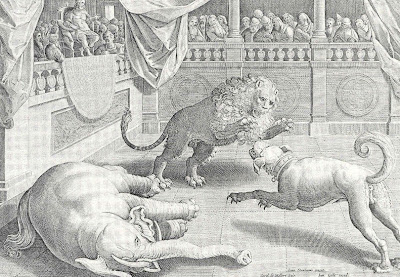 image/Stradanus/1503-1606
image/Stradanus/1503-16061610
About this time Frederic Ulric, son of the Duke of Brunswick, arrived in England, and made a Tour to various places in this country. When in London, he was lodged and entertained by his cousin Prince Henry; and on the 20th of April, the two Princes, 'accompanied with the Duke of Lennox, the Earle of Arundell, and others, came privatly to the Tower, and caused a great Lion to be put into the yard, and four Doggs at a course to be set upon him; and they all fought with him instantly, saving such as at their first comming into the yard in their fury fell upon one another, because they saw none else with whom to fight, for the Lion kept close to the trap-doore at the further end of the yard. These were choise Dogs, and flue al at the Lion's head, whereat the Lion became enraged, and furiously bit divers Dogges by the head and throat, holding their heads and necks in his mouth, as a cat would hould a rat, and with his clawes he tore their flesh extreamly; al which notwithstanding, many of them would not let go their hould, untill they were utterly spoiled. After divers courses and spoyle of divers Doggs, and great likelihood of spoile of more, which yet lay tugging with the Lyon, for whose rescue there entred in three stout Beare-wards, and set a lustie Dogge upon the mouth of the Lyon; and the last Dog got ful hould of the Lion's tung, puld it out of his mouth, held it fast, that the Lyon neither bitte him nor any other; whereupon it was generally imagined that these Doggs would instantly spoile the Lyon, he being now out of breath, and bard from biting; and although there were now but three Doggs upon him, yet they vexed him sore; whereupon the above mentioned young lusty Lyon and Lyonesse were both put out together, to see if they would rescue the third, but they would not, but fearfully gazed upon the Doggs. Then two or three of the worst Doggs, which had left the first Lion, ran upon them, chased them up and down the yard, seeking by all means to avoyd the Doggs; and so soone as their trap-doore was open they both ran hastily into their den, and a Dog that pursued them ranne in with them, where all three, like good friends, stood very peacably without any manner of violence eyther to other; and then the three Beare-wardes came bouldly in againe, and tooke off all the Doggs but one from the Lyon, and carried them away. The Lyon having fought long, and his tongue torne, lay staring and panting a pretie while, so as all the behoulders thought hee had been utterly spoiled and spent; and upon a sodaine gazed upon that Dog which remained, and so soone as hee had spoiled him, espying the trap-doore open ranne hastilie into his den, and there never ceast walking up and downe, to and fro, untill he had brought himselfe into his former temperature.

The 23rd of June, the King, Queen, and Prince, the Lady Elizabeth, and the Duke of Yorke, with divers great Lords, and manie others, came to the Tower to see a triall of the Lyon's single valour against a great fierce Beare, which had kild a child that was negligently left in the beare-house. This fierce Beare was brought into the open yard behind the Lyon's den, which was the place for fight; then was the great Lyon put forth, who gazed awhile, but never offred to assault or approch the Beare; then were two mastife dogs put in, who past by the Beare, and boldly seazed upon the Lyon; then was a stone-horse put into the same yard, who suddenly scented and saw bothe the Beare and Lyon, and very carelesly grazed in the middle of the yard between them both: and then were sixe dogs put in, the most whereof at first seazed upon the Lyon, but then sodainly left him, and seazed upon the horse, and would have werryed him to death, but that three stout beare-wards, even as the King wished, came boldly in, and rescued the horse, by taking the dogs off one by one, whilest the Lyon and Beare stared uppon them, and so went forth with their dogs; then was that Lyon suffered to go into his den againe, which he endeavored to have done long before; and then were divers other Lyons put into that place, one after another, but they shewed no more sport nor valour than the first, and every of them so soone as they espied the trap-doores open, ran hastily to their dens; then, lastly, there were put forth together two young lustie Lyons, which were bred in that yard, and were now grown great: these at first began to march proudly towardes the Beare, which the Beare perceiving, came hastily out of a corner to meet them, and sodainly offred to fight with the Lyon, but both Lyon and Lyonesse skipt up and downe, and fearefully fled from the Beare, and so these, like the former Lyons, not willing to endure any fight, sought the next way into their denne. And the fifth of July, according to the King's commandment, this Beare was bayted to death upon a stage, and unto the mother of the murthered child was given twenty pounds out of part of that money which the people gave to see the Beare kild.
The Progresses etc of King James the First Vol. II.
About this time Frederic Ulric, son of the Duke of Brunswick, arrived in England, and made a Tour to various places in this country. When in London, he was lodged and entertained by his cousin Prince Henry; and on the 20th of April, the two Princes, 'accompanied with the Duke of Lennox, the Earle of Arundell, and others, came privatly to the Tower, and caused a great Lion to be put into the yard, and four Doggs at a course to be set upon him; and they all fought with him instantly, saving such as at their first comming into the yard in their fury fell upon one another, because they saw none else with whom to fight, for the Lion kept close to the trap-doore at the further end of the yard. These were choise Dogs, and flue al at the Lion's head, whereat the Lion became enraged, and furiously bit divers Dogges by the head and throat, holding their heads and necks in his mouth, as a cat would hould a rat, and with his clawes he tore their flesh extreamly; al which notwithstanding, many of them would not let go their hould, untill they were utterly spoiled. After divers courses and spoyle of divers Doggs, and great likelihood of spoile of more, which yet lay tugging with the Lyon, for whose rescue there entred in three stout Beare-wards, and set a lustie Dogge upon the mouth of the Lyon; and the last Dog got ful hould of the Lion's tung, puld it out of his mouth, held it fast, that the Lyon neither bitte him nor any other; whereupon it was generally imagined that these Doggs would instantly spoile the Lyon, he being now out of breath, and bard from biting; and although there were now but three Doggs upon him, yet they vexed him sore; whereupon the above mentioned young lusty Lyon and Lyonesse were both put out together, to see if they would rescue the third, but they would not, but fearfully gazed upon the Doggs. Then two or three of the worst Doggs, which had left the first Lion, ran upon them, chased them up and down the yard, seeking by all means to avoyd the Doggs; and so soone as their trap-doore was open they both ran hastily into their den, and a Dog that pursued them ranne in with them, where all three, like good friends, stood very peacably without any manner of violence eyther to other; and then the three Beare-wardes came bouldly in againe, and tooke off all the Doggs but one from the Lyon, and carried them away. The Lyon having fought long, and his tongue torne, lay staring and panting a pretie while, so as all the behoulders thought hee had been utterly spoiled and spent; and upon a sodaine gazed upon that Dog which remained, and so soone as hee had spoiled him, espying the trap-doore open ranne hastilie into his den, and there never ceast walking up and downe, to and fro, untill he had brought himselfe into his former temperature.

The 23rd of June, the King, Queen, and Prince, the Lady Elizabeth, and the Duke of Yorke, with divers great Lords, and manie others, came to the Tower to see a triall of the Lyon's single valour against a great fierce Beare, which had kild a child that was negligently left in the beare-house. This fierce Beare was brought into the open yard behind the Lyon's den, which was the place for fight; then was the great Lyon put forth, who gazed awhile, but never offred to assault or approch the Beare; then were two mastife dogs put in, who past by the Beare, and boldly seazed upon the Lyon; then was a stone-horse put into the same yard, who suddenly scented and saw bothe the Beare and Lyon, and very carelesly grazed in the middle of the yard between them both: and then were sixe dogs put in, the most whereof at first seazed upon the Lyon, but then sodainly left him, and seazed upon the horse, and would have werryed him to death, but that three stout beare-wards, even as the King wished, came boldly in, and rescued the horse, by taking the dogs off one by one, whilest the Lyon and Beare stared uppon them, and so went forth with their dogs; then was that Lyon suffered to go into his den againe, which he endeavored to have done long before; and then were divers other Lyons put into that place, one after another, but they shewed no more sport nor valour than the first, and every of them so soone as they espied the trap-doores open, ran hastily to their dens; then, lastly, there were put forth together two young lustie Lyons, which were bred in that yard, and were now grown great: these at first began to march proudly towardes the Beare, which the Beare perceiving, came hastily out of a corner to meet them, and sodainly offred to fight with the Lyon, but both Lyon and Lyonesse skipt up and downe, and fearefully fled from the Beare, and so these, like the former Lyons, not willing to endure any fight, sought the next way into their denne. And the fifth of July, according to the King's commandment, this Beare was bayted to death upon a stage, and unto the mother of the murthered child was given twenty pounds out of part of that money which the people gave to see the Beare kild.
The Progresses etc of King James the First Vol. II.
Thursday 5 August 2010
progressive stencil
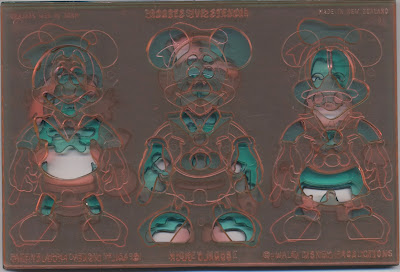 The Beast and the Sovereign, Volume I, translated by Geoffrey Bennington, Chicago: University of Chicago Press, 2009; xvi + 349 pp.
The Beast and the Sovereign, Volume I, translated by Geoffrey Bennington, Chicago: University of Chicago Press, 2009; xvi + 349 pp.“In this seminar from 2001 and 2002, Derrida explores the persistent association of bestiality or animality with sovereignty and continues his deconstruction of the traditional determinations of the human. The beast and the sovereign are connected, he contends, because neither animals nor kings are subject to the law—the sovereign stands above it, while the beast falls outside it from below. He then traces this association through an astonishing array of texts, including La Fontaine’s fable “The Wolf and the Lamb,” Hobbes’s biblical sea monster in Leviathan, D. H. Lawrence’s poem “Snake,” Machiavelli’s Prince with its elaborate comparison of princes and foxes, a historical account of Louis XIV attending an elephant autopsy, and Rousseau’s evocation of werewolves in The Social Contract.
Deleuze, Lacan, and Agamben also come into critical play as Derrida focuses in on questions of force, right, justice, and philosophical interpretations of the limits between man and animal.”
--Jacket copy, The Beast and the Sovereign, Volume I MORE
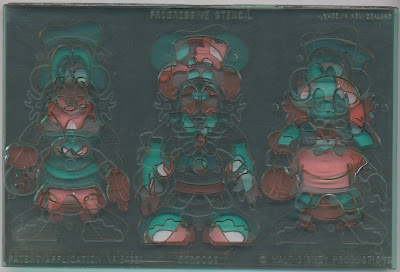
Subscribe to:
Posts (Atom)













